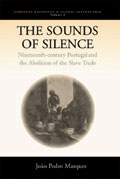Book review
| Book: | The Sounds of Silence: Nineteenth-Century Portugal and the Abolition of the Slave Tradeby João Pedro MarquesBerghahn Books, 2006 ISBN: 1571814477; 304pp.; price £50.00 |
| Reviewer: | Manuel BarciaUniversity of Leeds |
Unequivocally, until today the vast majority of the academic works on the history of the abolition of the transatlantic slave trade have focused on the British side of the story. Having said that, it is also true that during recent years more and more studies have addressed the processes of abolition in countries and territories of Africa, the Americas, and Europe. The Sounds of Silence, first published in Portuguese and now opportunely translated into English, is a particularly meticulous study on the obstacles that the abolitionist cause had to face throughout the first half of the nineteenth century in one of the most pro-slave trade countries in the western hemisphere: Portugal.
The book is divided into six main chapters, each of them discussing a specific period of the battle for the abolition of the slave trade, but always keeping an eye on the internal and external political developments that affected Portugal. Chapter 1 explores the origins of Portuguese abolitionism and how the commitments of the wealthy Portuguese affected the effective development of abolitionist ideas. Marques is keen to note how 'Tolerationism' usurped the place of 'Abolitionism' and how policies from above shackled any attempts of changing public opinion on the necessity of bring the Portuguese involvement in the slave trade to an end.
Chapter 2 is particularly good. Here Marques examines in-depth the diplomatic battles that the Portuguese authorities had to fight against British pressures after the end of the Napoleonic wars. He reveals the stratagems of the Portuguese diplomats in the Congress of Vienna, and the way in which they reluctantly agreed to sign the Convention of 28 July 1817, with the British instituting the right of search for slaves, and the establishment of Courts of Mixed Commissions devised to look after the effective abolition of the trade in the Atlantic.
Supported by a vast array of primary sources, Marques deals in chapters 3 and 4 with what was possibly the most politically complicated period in the modern history of Portugal. Here he wisely wades through the two decades that followed the independence of Brazil. This Portugal is a convulsing kingdom, suddenly deprived of its main source of wealth, but also, alas, relieved of its slaves. However, despite losing Brazil, Portuguese merchants did not stop trading in slaves, but, as Marques explains, took advantage of the various loopholes existing in the abolitionist laws to expand their businesses. In some cases these slave traders acquired fake papers and flags, while in others they obtained dual passports so as to use one of them south and the other north of the Equator. In these two chapters Marques also examines the characteristics of the Septembristas and their ambiguous positions towards the issue of Abolition, and the gradual changes in public opinion about the path that Portugal should follow. Chapters 5 and 6 deal with the last years of the Portuguese slave trade and with the final triumph of the abolitionist cause, which Marques called a 'victory for persistence', and with the aftermath of this long-lasting fight. Here, he is keen to remind us that Portugal was far from adopting real progressive policies, and to support this claim he recalls the history of the Portuguese policies concerning its African colonies.
The Sounds of Silence is a solid book that we will all welcome on our shelves. The depth of Marques's analysis alone would be enough to make this book one of the most significant contributions to the recent scholarship on the trans-Atlantic slave trade. Nevertheless, Marques's primary sources are tremendously revealing and the variety of topics examined all together make this book a crucial piece of academic work on the field. A few minor problems here and there undermine some of Marques's conclusions, however. For instance, he mentions the Courts of Mixed Commissions, but never really discusses them comprehensively, leaving us a little in the dark. The impact of the loss of Brazil is not given a full follow-up treatment throughout the book-it is only thoroughly discussed in chapter 3. Finally, the ideas and personalites of some of the most important historical characters-both Portuguese and British-are not fully explained. I would have like to know more, for example, about the background and ideas of characters such as Sá da Bandeira or the Duke of Palmela. In general, though, these are minor problems that do not affect to a great extent the final result. João Pedro Marques has given us an outstanding and refreshing book that has certainly made me look at the slave trade from a different perspective, and from which I have been able to draw new conclusions.
March 2007

